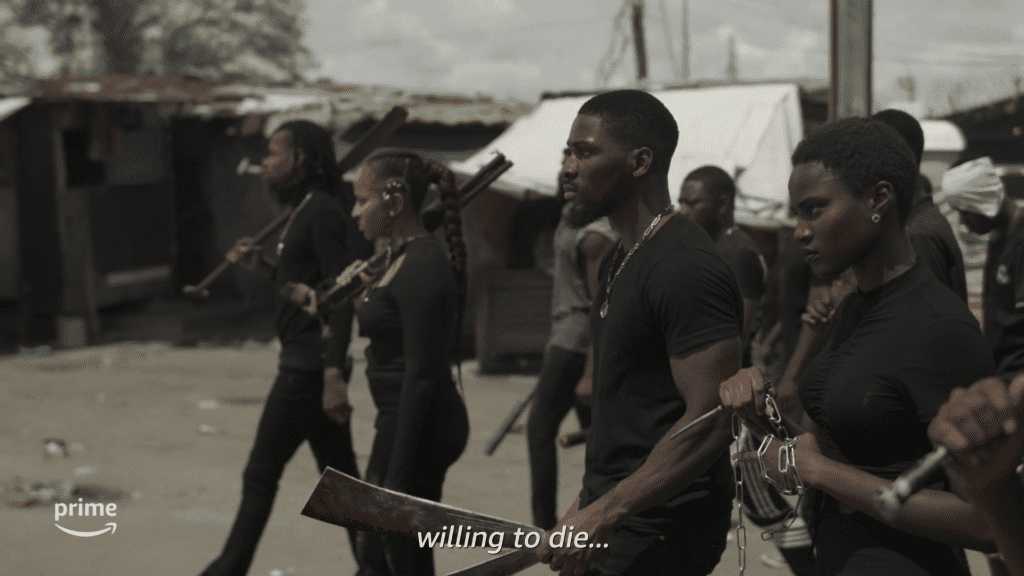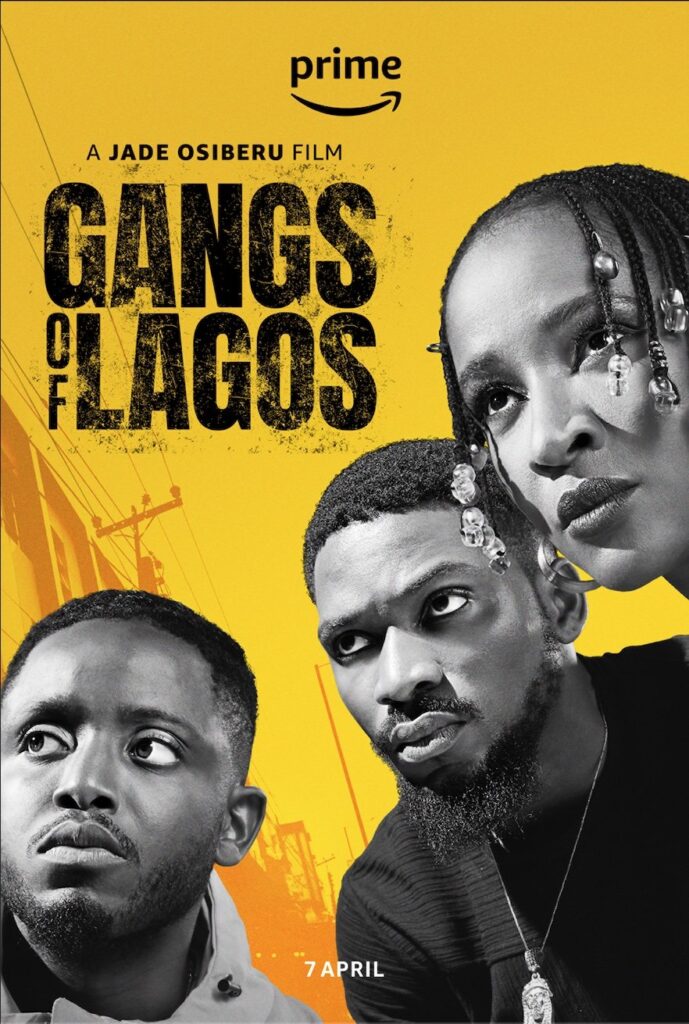Gangs of Lagos, like Brotherhood, isn’t fiction. It is a cinematic exploration of our lives as Nigerians. It spotlights the damage Nigerian societies and Nigerians are compelled to witness when government is apathetic to developing and solving social issues…
By Seyi Lasisi
Movies are mirrors that cast our identity back to us. Beyond representing aspects of our lives on-screen, movies are great places for building friendships. We build an intimate and lifelong relationship with on-screen characters that represent us, our drive, and our vision. I have created such connections with a few Nollywood characters: Akin (Tobi Bakre) in Brotherhood, and Ishaya (Mike Afolarin) in Far from Home. My attachment to these characters will span decades. These characters represent aspects of my childhood community, Ajegunle. I am a resident of Ajegunle, and Ajegunle, like Isale Eko, the setting of Jade Osiberu’s Gangs of Lagos, is distinct for its affiliation with violence. Watching Tobi Bakre in Brotherhood and now in Gangs of Lagos, I know I have secured a permanent bond with Bakre’s characters in both films. These two films bring aspects (people, places, and life decisions) of my life to the surface.
Prime Video’s debut African original film, Gangs of Lagos, is set in Isale Eko, the habitat of one of Nigeria’s thriving markets, and a violence-prone area. Young Oba (Maleek Sanni), Ify (Oluwafemi Lawal), and Gift (Small Mummy) are residents of Isale Eko. By forming a lifelong relationship, the trio is getting familiar with the mantra of their community: stealing, killing, gambling, prostitution, and trafficking in all its variant guises. Osiberu’s first scenes are forerunners and shapers of the characters’ course. In Brotherhood, the gruesome murder of Akin and Wale’s mother shapes the kids’ life choices. Gangs of Lagos samples a similar formula: two minors commit robbery. One is brave; the other is timid. This distinct identity that they both bear will continually feature through the scenes where Oba and Ify are shown. By subtly relying on Oba for assistance, Ify and Gift create a deeper bond, navigating their deadly community.
(Read also: Awon Boyz, an Emotive Documentary on the Lives of Lagos Hustlers, Now Streaming Globally on Netflix)
In recent decades, Nigeria witnessed a high turnout of voters during the general and gubernatorial elections. En masse on the street are Nigerians of various age grades pitching for change. Although Gangs of Lagos is set in the pre-gubernatorial election period and had been in production before the recently-concluded real-life Lagos governorship elections, it isn’t hard to catch a glimpse of how typical it is of the recently-concluded Lagos elections. By placing notable, though fictional, politicians and street lords in the film, Osiberu subtly brings a question to the fore: who are the umpires in an election? The voters? The dominant street lords? The cash-on-hand politicians? Who decides who rules us?
(Read also: Nollywood’s Takeover in the Forthcoming 2023 Elections: A Possible Political Revolution or Not?)


The fabrics of Isale Eko are woven and adorned with a crime in variant forms. Gambling, compulsory taxes, smuggling of drugs, and forced prostitution complement traders’ activities. These thorn-filled garments of gamblers, prostitutes, and tax collectors are clothes working-class people in Isale Eko adorn daily for their survival. And like Oba and Ify, I am familiar with the routine: the deafening gunshots, the cries of agonies, the traumatic sound of bottles and cutlasses as they pierce a skin. The silent prayers of parents and lovers hoping their child or partner will return safely to their embrace is a familiar tune. It is the background sound of life in other notable areas of Lagos, such as Bariga, Oshodi, Mushin, and Ikorodu. Gangs of Lagos, like Brotherhood, isn’t fiction. It is a cinematic exploration of our lives as Nigerians. It spotlights the damage Nigerian societies and Nigerians are compelled to witness when the government is apathetic to developing and solving social issues.
(Read also: Brotherhood Review: Jade Osiberu Delivers Quality Fun in Trope-Filled Action Flick)
For children in these populous communities, there are willing mentors and guardians. Oba, Ify, and Gift meet one, Nino (Tayo Fanirin.) Their relationship samples Little Chiron’s (Alex R. Hibbert) and Juan’s (Mahershala Ali) guardian-cum-father relationship in the award-winning Moonlight. Oba and Nino’s cordial relationship, although temporary, continually defines Oba’s adult choices. Another bond that Gangs of Lagos shares with Moonlight is the mother figure. Chiron’s mother (Naomie Harris) seeks solace in drinks and drugs. Oba’s mother (Iyabo Ojo) has a Nigerian variant of addiction: she is a passionate Christian. Her preference for seeking religious alternatives to dissuade Oba from following in his father’s pathway eventually pushes him far from home.
By treading the sensitive issue of pre-election manipulation months prior to its existence, the storyline, co-written by Jegede and Osiberu reminds me of Teju Cole’s sentences: “Writing as writing. Writing as rioting. Writing as righting. On the best days, all three.” Does the script adhere to these markers of a good piece of writing as adjudged by Cole? Is the film, the story, a coherent script? Yes. Plot-wise, it’s a leap from Brotherhood. Though Terrible’s ( Black Kamoru) revelation could have been better. Does it riot? An outright yes might not suffice for this. But, yes it does. Does it attempt to make things right? This is a question I will leave for you to answer.
(Read also: King of Boys Review: Kemi Adetiba’s King of Boys: The Return of the King is Enjoyable But it Lacks Bite)
Crime-focused films usually try to humanise its villain. In Kings of Boys, Eniola Salami (Sola Sobowale) is generous with her protective gaze and philanthropist gesture. Nino has a semblance of Salami’s benevolence. His generosity endears him to the people of Isale Eko. Eniola Salami and Nino subtly represent Vito Corleone, from Godfather, in Nigerian cinema. For the people of Isale Eko, it’s common knowledge that their “helper,” Nino, dines with their political tormentors; yet, he still selectively provides succor to his own.
Jade Osiberu has always been careful in her casting choices. In her filmography as producer and director, she has a penchant for casting and adorning well-known comedians and musicians in new apparel. In Ayinla which she produced, Abebowale ‘Mr. Macaroni’ Adedayo, playing the fictional killer of the legendary Ayinla Omowura, moves miles away from his usual comic self. Another comic act Osiberu has cast is Bright ‘Basketmouth’ Okpocha. By playing the non-smiling Shadow, Basketmouth, in Brotherhood, gives a new identity to himself. In her recent outing, Gangs of Lagos, Osiberu enlists the help of two musicians: one, Temidayo ‘Zlatan Ibile’ Omoniyi, is notable for his street songs, and the other, Chike, a Soul singer. Both musicians retain their non-fictional identities. Chike is still the Boo of the Booless. And Zlatan hasn’t lost his affinity with street lingua franca. Both musicians’ performances prove Osiberu’s directorial ability to make actors out of entertainers.

The defining scene of the film, for me, is set in the church. This scene, which starts at a slow pace, gradually builds momentum and ends in a tense mood. Distinct from other scenes where blood is common, this scene is the film’s holy ground. Chioma Akpotha’s monologue, in this scene, might earn her an award for best supporting female actor. Asides showcasing Akpotha’s emotional performance, this scene essays how mothers, friends, and lovers fare when their relatives are killed. The dreams of the deceased are compelled to die, too.
The film is marketed for its action sequence movements. This makes it possible for viewers to watch with a singular intention: to see how Osiberu has improved in handling and delivering another action thriller. However, on reflecting on the film, the driving force is the story: the kids from Isale Eko, the dreams of underserved boys and girls in different ghettos in the world that become an illusion. Gangs of Lagos is a leap from Osiberu’s Brotherhood. The action sequence and fight scenes are better when compared to the latter. Nevertheless, barring the action scenes, the driving force of Gangs of Lagos is its exploration of love, truncated dreams, and revenge.
Rating: 3/5
(Gangs of Lagos is currently streaming on Prime Video.)
Seyi Lasisi is a Nigerian student with an obsessive interest in Nigerian and African films as an art form. His film criticism aspires to engage the subtle and obvious politics, sentiments, and opinions of the filmmaker to see how it aligns with reality. He tweets @SeyiVortex. Email: seyi.lasisi@afrocritik.com.





Lovely work, Seyi!
This is an exceptional review of gangs of lagos and Jade did an amazing job. It shows a deeper perspective of how Isale Eko truly is and makes me appreciate some “agberos” in Lagos.
Welldone!
I have a question. What message is Jade Osiberu trying to portray?